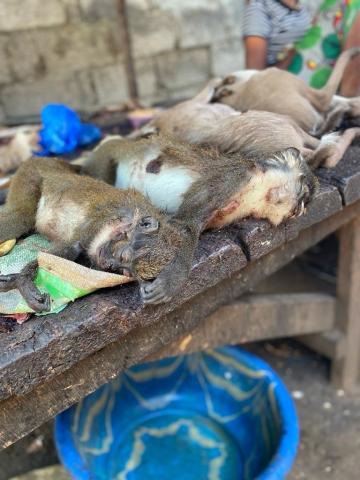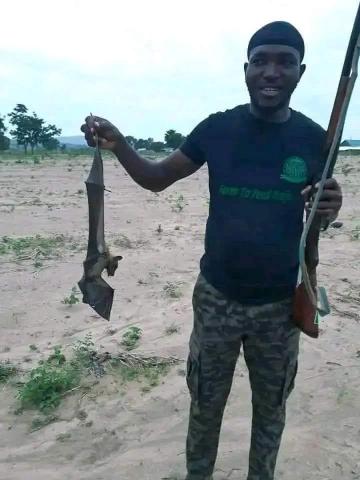By Emma Black
Sixty-five-year-old, Mariatu Koroma, recalls May 2014 like it was yesterday. She was selling bush meat including monkeys, bats, deer, bush rats and wild boar, at the Kingsway Corner Market in Kenema, in the east of Sierra Leone. May 2014 also marked the first recorded case of the Ebola Virus Disease (EVD) in Sierra Leone, in the Kenema District, which is why that month and year are so memorable to Koroma.
“I had been selling bush meat for many years. I was well-known by the hunters, who would bring the animals from the bush (forested areas) around Kenema and Bo. I’d butcher… I’d sell… I had to sell to put my children in school and I was able to pay my bills from my bush meat business,” said Koroma, a widow and mother of four.
By July 2014, the Sierra Leone Ministry of Health and Sanitation, on the advice of the World Health Organization (WHO), banned the sale and consumption of any type of wild bush meat.
“I stopped for a short time that year. The Police held a meeting at the market sometime during the rainy season and they told us about the bylaws that banned bush meat. But we continued to sell shortly after that meeting because my family relies on the profit I make from the bush meat for food, to pay house rent and for school charges and lunch for my children.”
The hunting, butchering, sales and consumption of bats and primates continues unabated across many rural areas of Sierra Leone. In the course of the hunt and butchering and sale of monkey meat, there is a huge risk of primate-to-human cross-species transmission of infectious agents, including the Ebola virus. The haphazard, unhygienic and unprofessional butchering and processing of monkey meat, as is the tradition in Sierra Leone, increases the risk of disease transmission astronomically. The virus first spreads to people through direct contact with the infected blood, body fluids and tissues of bats and monkeys. Unfortunately, most Sierra Leoneans don’t know about or understand the risks involved in butchering and eating monkey meat.
Preparing monkey meat and consuming the meat presents a monumental risk of the exchange of body fluids, such as urine, saliva, vomit, feces and sweat, of primates into humans. The hunters, butchers and sellers risk transcutaneous exposure to the body fluids of monkeys, which may carry a host of infectious agents, including Ebola.
Ebola outbreak in West Africa
The Ebola virus, formerly known as Ebola hemorrhagic fever, causes an acute, serious illness, which is often fatal if untreated. Fatality rates have ranged from 25% to 90%. There are five types of Ebola virus and four of them can be transmitted to humans.
According to the U.S. Center for Disease Control and Prevention (CDCP), the 2014–2016 outbreak in West Africa was the largest, longest, deadliest and most complex Ebola outbreak since the virus was first discovered in 1976.
The outbreak started in a small town, Meliandou, in the Gueckedou District of Guinea in December 2013, near the borders of Sierra Leone and Liberia. It was believed to have originated from bats and bush meat consumption and was sustained by human-to-human transmission through infected blood and body fluids, according to the WHO.
By the end of January 2014, Guinean officials issued a medical alert and on 23 March 2014, with 49 cases and 29 deaths, the WHO officially declared an outbreak of Ebola caused by Zaire ebolavirus. By July 2014, the outbreak spread to the capitals of Guinea, Sierra Leone and Liberia. A State of Emergency was declared on 31 July 2014, by then President Ernest Koroma, in Sierra Leone.
On 8 August 2014, WHO declared the Ebola outbreak in West Africa a Public Health Emergency of International Concern (PHEIC), which is designated only for events with a risk of potential international spread or that require a coordinated international response. Over the duration of the epidemic, EVD spread to seven more countries. The West African Ebola outbreak ended with more than 28,600 cases and 11,325 deaths across Guinea, Liberia and Sierra Leone. An additional 36 cases and 15 deaths occurred outside of these three countries. In Sierra Leone, 3,956 people died and more than 14,000 cases were reported. The WHO has admitted that the true toll of the epidemic “was certainly greater than the 28,616 suspected, probable, and confirmed cases of EVD that were reported.”
According to the UN Food and Agriculture Organization (FAO), fruit bats, which are hunted for food in parts of Africa, are considered to be likely and stealthy carriers of the virus. The FAO urged people to avoid bats and monkeys altogether because handling the animals in food preparation could put them in contact with the virus. "Anyone who handles, skins or butchers an infected wild animal is at risk of contracting the virus," said the FAO's chief veterinary officer Juan Lubroth.
Martha Sandi, 29, took over her mother’s bush meat business in Kenema after her mother got sick. “We all relied on our mother, who had been in the bush meat business for more than 10-years. We eat all kinds of bush meat because it is sweet and cheaper than beef. During Ebola, we continued to collect bush meat from hunters, cut up the meat and sell.”
From a Public Health journal article published just after the Ebola outbreak ended, “Researchers found a bushmeat market still operating in Kenema (Sierra Leone) in spite of the total ban and also witnessed arrival of a large stock consignment of game intended for sale and consumption in the town of Daru (about 50kms from Kenema). Observations clearly showed that women were exposed to blood and other fluids from wild animals while processing bushmeat. Some of the animals from which the bushmeat was harvested included chimpanzees, monkeys, antelopes and wild fruit bats. Investigations revealed that very often there was contact with fluids from wild animals while processing and eating bushmeat.”
Bush meat markets today
Mariatu Koroma, at the Kenema market, collects the dead monkeys and bats from the hunters. She lays the animal on a wooden table where she dissects the meat from the internal organs. She pries the animals open with her bare hands and uses an ancient, worn-down knife to separate the meat from the skin, while tossing the heart, liver and internal organs into a plastic bowl.
Koroma said, “When the hunters bring the bats and monkeys to the market, we clean the meat… peel the skin and empty the gizzards into a bowl. We then cut it into pieces for sale or we sell them whole.”
Veterinarian Dr Gudush Jalloh is the Director of the Animal Welfare Society in Sierra Leone. He reinforced the risks and need to end hunting, butchering and eating of wild animals, especially bats and monkeys. “We have no idea what diseases those animals may be suffering from before it is killed,” he said. “Many diseases come from animals like rabies, Lassa fever and Ebola. And, killing the animal doesn’t kill the viruses or diseases.”
Dr Jalloh described how most animals are slaughtered. “An animal seller or hunter will tie the animal and kill it on the ground. Blood and other body fluids spill, internal organs are removed and collected. Skins are removed and hung.” He added, “The way wild animals are hunted and butchered and eaten is very risky… people are unaware of the risks of disease transmission from animals.”
Dr Mohamed Vandi, the Director of Health Security and Emergencies at the Ministry of Health and Sanitation, said, “I can’t tell how safe the people that hunt, process and eat bush meat are. Before Ebola, people were eating bush meat - during Ebola people were eating bush meat and after Ebola, people are still hunting, butchering and eating bush meat.” He continued, “Lassa fever, Ebola and other diseases come from animals… from sick animals. But, people can’t tell if the animal is sick when it’s caught or killed or butchered.”
Dr Vandi speculated, “When the animal is killed, it’s usually bleeding. The carcass is then carried over a hunter’s shoulder or in a small bag. The blood and body fluids will be on the hunter’s hands and probably on his clothes and on the carry bag. Then, when the bat or monkey is butchered, blood, along with other fluids, is spilled onto the butcher block, and on the woman’s hands. Even the internal organs can be infected and those are either discarded or cooked. At any stage of the process, infection could occur and diseases can be transmitted into the human population.”
In Kasseh village in the Port Loko District of northern Sierra Leone, 24-year-old Foday Mansaray, hunts bats, monkeys and other wild animals. He said his father was a hunter and now he continues the tradition. “It’s a way I can earn some money to support my family,” he said. Mansaray described a hunt for a small monkey. “I hear them, usually, and follow them in the trees and bushes.” He added, “When I shoot… there’s blood and usually feces and urine and I don’t know what other liquids.”
Lily Kainwo of the USAID-funded Stop Spillover project, working in the Kenema District of Sierra Leone, said, “It’s almost impossible to stop people from eating bush meat… it’s a source of income and food and things have been that way for generations. What we try to do is inform the hunters and butchers of bats and monkeys to take interventions to prevent their direct contact with body fluids, waste and blood from the animals. We try to sensitize the people about the risks involved.”
The Ebola outbreak was officially declared over in Sierra Leone on 17 March 2016, by the WHO, at a gala event in Freetown. Two and a half years after the first case was discovered, the outbreak ended with more than 28,600 cases and 11,325 deaths, across West Africa.
The link between zoonotic spillover of Ebola, among other diseases, and global pandemics remains indisputable. Hunters and butchers/sellers of monkey and bat meat are at enormous risk of contracting Ebola, which means no one in Sierra Leone is safe.
This story has been published with support from Internews' Earth Journalism Network
Copyright © 2022 Politico (21/12/22)









